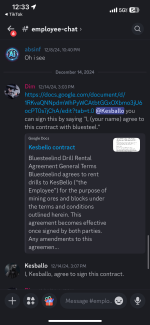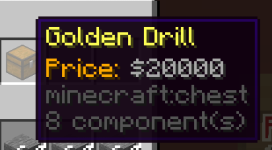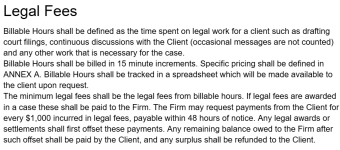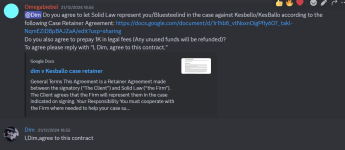- Joined
- Aug 6, 2023
- Messages
- 69
- Thread Author
- #1
Case Filing
IN THE FEDERAL COURT OF THE COMMONWEALTH OF REDMONT
CIVIL ACTION
Dimitre977 (represented by Solid Law)
Plaintiff
v.
kesballo
Defendant
COMPLAINT
The Plaintiff complains against the Defendant as follows:
On the 14th of December at 3:07 PM EST, the Defendant agreed to a contract to rent a golden drill from my client for $200 per hour(P-01 and P-05). Staff logs show Kesballo started the rental period by “buying” the drill from the employee-only chestshop later that day (P-03) and since then has failed to return the drill to the Plaintiff despite a multitude of reminders (P-01 and P-04). The Defendant has also failed to pay the plaintiff the rental fees breaching the signed contract, even after being threatened with possible court action, causing great financial loss for the Plaintiff (P-01) since he can’t rent the drill out to someone else. It is not possible that the defendant hasn’t seen the messages or warnings yet, given it has been over 3 weeks since the contract was signed with the Plaintiff (P-01). The reason why this case wasn’t filed earlier, is because of technical issues with the chestshop logs. These logs could not be retrieved by the plaintiff, but had to be retrieved by staff.
I. PARTIES
1. Dimitre977 (represented by Solid Law)
2. kesballo
II. FACTS
- Kesballo entered a rental contract with Dimitre977 for a golden drill at a pricing of $200 per hour active or inactive
- Kesballo took a golden drill from Dimitre977
- Kesballo failed to pay the rental price for the drill
- Kesballo was warned by Dimitre977 to pay and return the drill
- Kesballo failed to return the drill to Dimitre977
III. CLAIMS FOR RELIEF
- By failing to pay the rental price Kesballo breached a signed contract as governed by the Contracts Act
IV. PRAYER FOR RELIEF
The Plaintiff seeks the following from the Defendant:
1. $200 per hour compensatory damages from the beginning of the rental period, currently at least $138,000 (rounded down, 690 hours), until the compensatory damages for the drill are paid or the drill is given back.
2. $50,000 in punitive damages for the lack of communication and outrageous conduct
3. $20,000 in compensatory damages for the price of the drill
4. Currently $62,400 in legal fees, representing 30% of the case value, which will increase as the compensatory damages are increasing.
By making this submission, I agree I understand the penalties of lying in court and the fact that I am subject to perjury should I knowingly make a false statement in court.
DATED: This 6th day of January 2025
P-01 DM screenshots between kesballo and Dimitre977 containing rental contract signing
P-02 the golden drill chestshop
P-03 Proof Kesballo having the Golden Drill
P-04 Staff logs showing the Drill wasn’t returned
P-05 The rental contract






